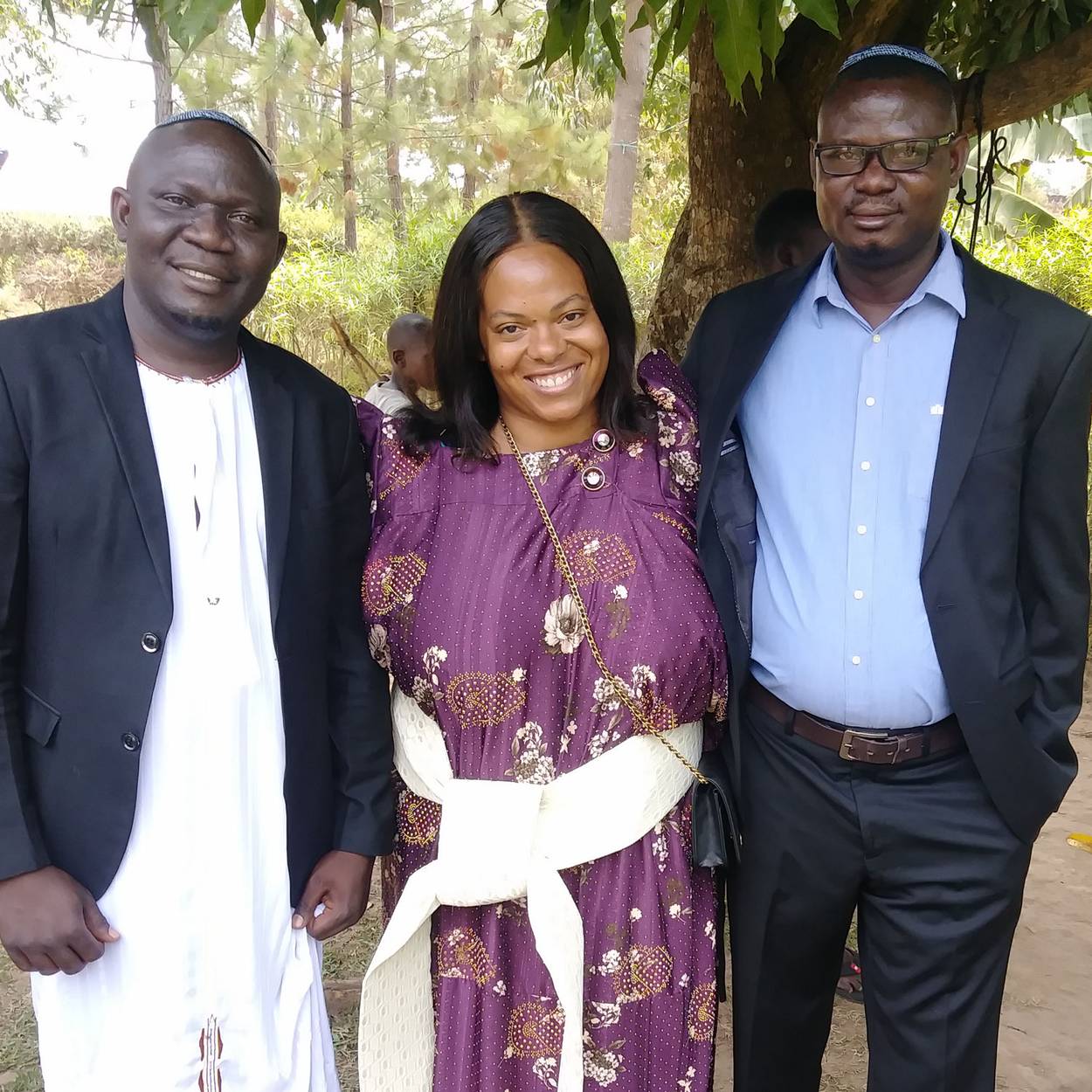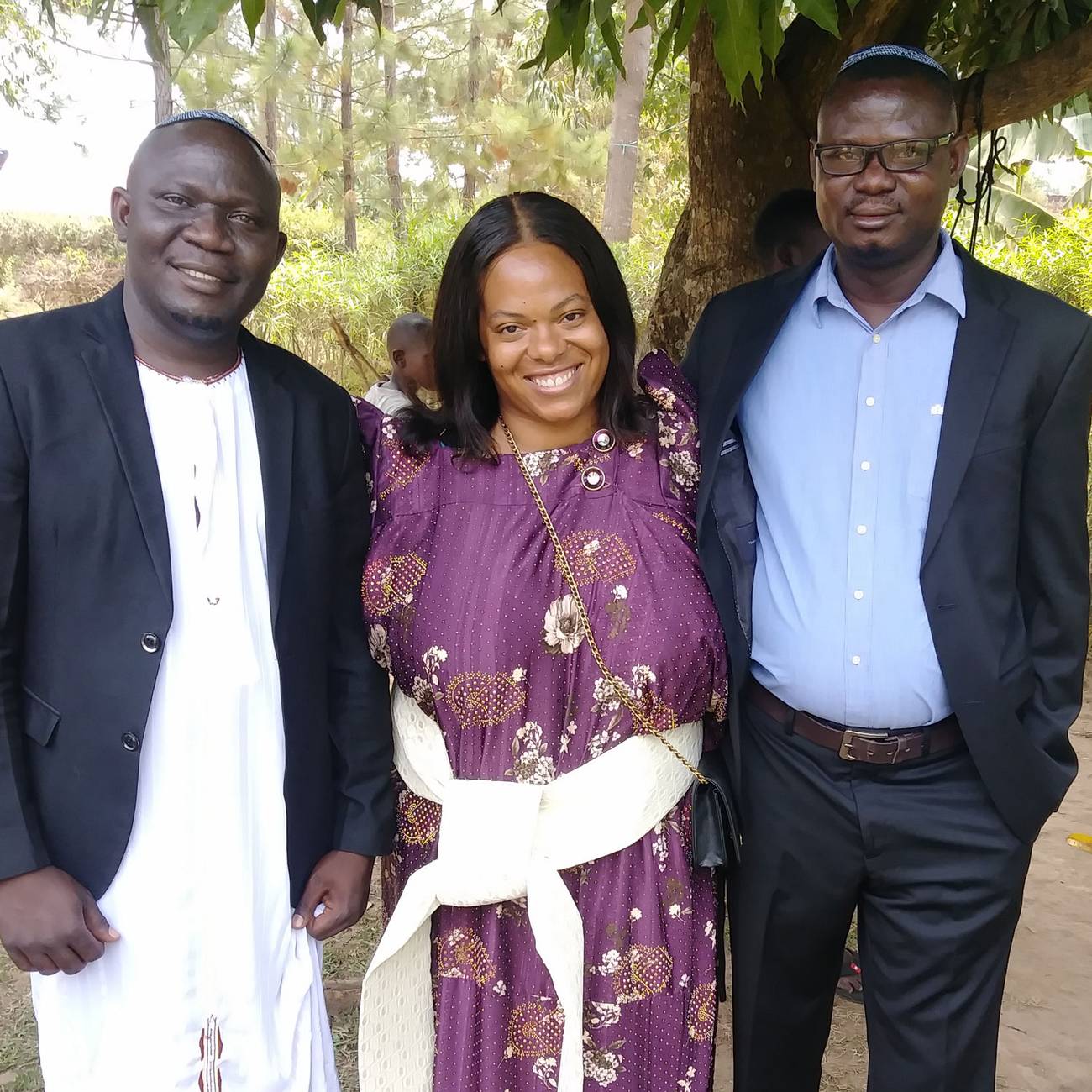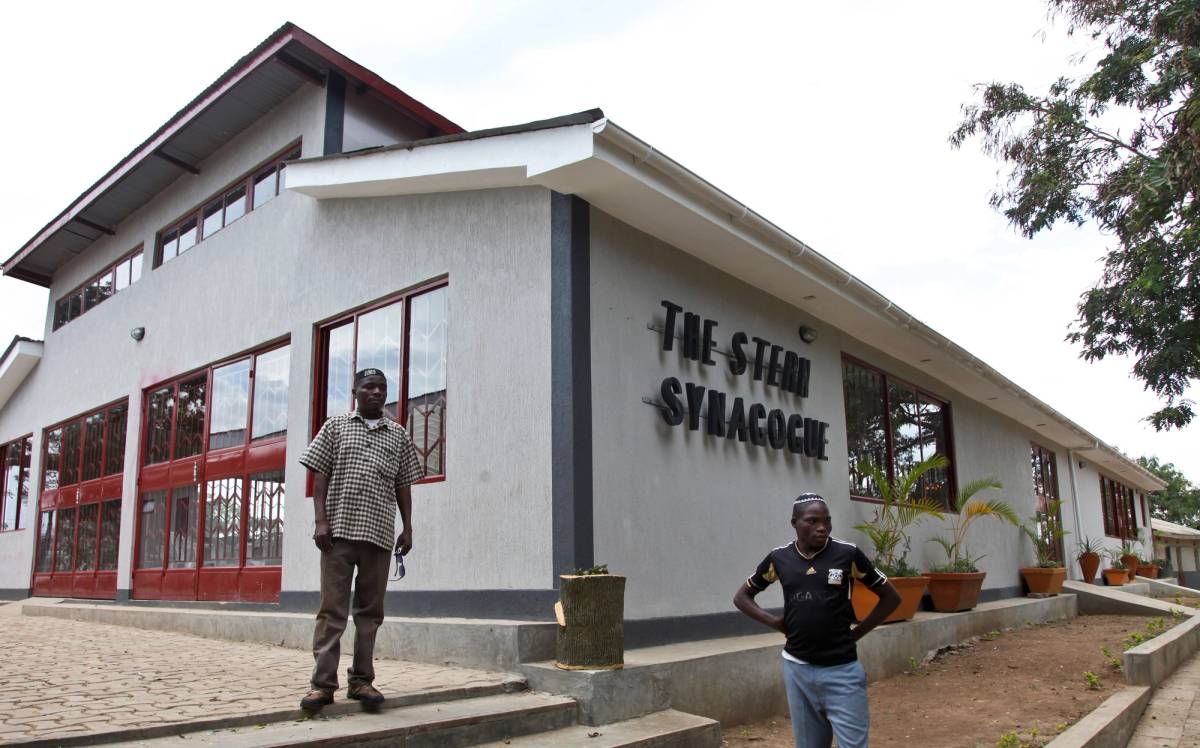The Accidental Expat
Growing up in America as a Black Jew, I longed for a sense of unquestioned belonging in the Jewish community. Now, I’ve found that feeling—in Uganda.

Courtesy the author

Courtesy the author

Courtesy the author

Courtesy the author
I was in ninth grade when I decided to “come out”—as a Jew.
Growing up African American in Southern California as the child of Jews by choice, attending a mostly gentile public middle school, I had used absolutely every stupid excuse for any external hints at my Jewishness.
A kid would ask me, “What’s that big cracker in your lunchbox?” I’d answer: “Mom gets matzo when it’s on sale.”
My seventh-grade teacher asked, “Why were you out of school yesterday? Why does your absence report say ‘religious holiday’?” I mumbled, “We visited family friends for their holiday.” I’d have rather been a bad liar than a Jew.
Being African American in my majority-white, West LA middle school was hard enough. Being a Jew in public was “optional.” My school had some Jews—and they all knew that someone like me just wasn’t one of them. So, outside of the synagogue and the house, my Judaism was like a secret love affair. The things that inspired and delighted me in private were the things that I dreaded being exposed at school.
But when it was finally time to go to a racially diverse high school a few miles south, it was my opportunity to finally come out. The high school was in a different district and had very few of the same kids. I could reinvent myself just by taking that part of myself out of the closet. I felt bold and proud and relieved. I no longer felt I had to buy their approval by hiding this precious piece of myself. The social survival math was finally adding up.
Around the same time, my mother took me to a Hanukkah party for Jews of color in California. The guest of honor was a young rabbinical student from Uganda. I was nervous to meet him and didn’t really know what to say but “Welcome” and “Happy Hanukkah.” But we couldn’t take our eyes off him and every word he spoke would perk up our ears and hush our side-chatter. His name was Gershom Sizomu, a name my mother and I repeated over and over again in the car after we left.
After he graduated from rabbinical school in Southern California and returned to Uganda in 2008, Rabbi Gershom stayed on our minds. As a spiritual leader of Uganda’s Abayudaya Jewish community, he made history in 2016 as the first Jew elected to Uganda’s parliament, five years after he first ran for office but lost, as Matthew Fishbane reported for Tablet at the time. But his impact was more than political; it was personal. Years later, he would change my life as an African American Jew in ways I never could have imagined, bringing me to a new place of acceptance—and a new place to live.
After I moved to Dallas as a young adult, my religious life evolved gradually. Fresh out of a university that had just a handful of other Jews, my idea of an intentional Shabbat practice was knitting a scarf while listening to the “Old Testament” CD audio-Bible that I purchased at a Christian bookstore. After meeting more Jewish friends and some encouraging rabbis, I ended up moving to the eruv, walking to synagogue, keeping a kosher kitchen, and getting rid of my pants.
Alternating between both Conservative and modern Orthodox synagogues, I have always been attracted to the “messy middle”—balancing between the secular and the holy, the modern and the ancient. Living my decidedly contemporary life inside of an overwhelming, all-encompassing relationship with Hashem means it’s a slow walk but a deliberate one.
The most disorienting thing about being African American and Jewish was the way my sense of closeness to the community was tenuous and brittle. A “just curious” question or “harmless” assumption could instantly steal away the haimish quality of almost any synagogue experience and kill my prayer afterglow.
Many times in synagogue, I made sure to sing every hymn just a little bit louder in an effort to stave off getting the third degree. (See? I’m singing because I’m Jewish and I know this song, OK? Please, please don’t ask me that “well-meaning” question.)
Of course, the loud singing tactic only worked with the ladies in the women’s section. At a Passover Seder, I was once smugly asked by a man (whose wife I sat next to regularly in synagogue) if I had ever been to a Seder before. Realizing how dismissive he was to not even recognize me, I answered, “Yes, every year of my life. My name is Shoshana, and I am Jewish.” (His embarrassed wife huffed at him, annoyed.) The next time I attended services, I was all he could see as we were leaving the sanctuary. He sheepishly grinned at me, hardly meeting my gaze. I said a curt “Shabbat Shalom” and grumbled to a Jewish African American girlfriend who was staying with me that Shabbat.
One sad day, I was audibly sobbing in the corner at a funeral of a dear elderly Jewish friend. A “well-meaning” stranger approached to ask me if I was the departed man’s home health care worker. My friend had been like a grandfather to me, and yet now I was classified as “the help.” The pain of losing him and having to pause my grieving to qualify my heartache really stung.
At synagogue, whenever I saw another Black person, I absolutely had to connect with them and become friends. This only happened a handful of times but I’m very thankful that it did.
The organizers at the Jewish young adult events always welcomed a diverse crowd. We would eagerly pose for photos at Purim parties, Chol HaMoed Sukkot dinners, and Lag Ba’Omer barbecues. But neither I nor any of the other Black attendees ever had our photos appear on the organization’s website or Facebook page. It was as if they wanted the public to think that there were no Jews of color there at all.
My very presence is an affront to a narrow, insular self-conception of who Jews in America are. I become an inadvertent activist just by showing up. My deep desire to experience belonging and build community with other Jews is vital to being reconciled with myself. Judaism is an inherently communal religion practiced by our nation, our people. I need to feel belonging to fulfill the essence of my soul in connection with our G-d.
Speaking publicly about not belonging is about much more than my temporarily hurt feelings. From the Talmud, Shevuot 39a: Kol Yisrael arevim zeh bazeh, which means “all of Israel are responsible for each other.” We share a common destiny that demands we join together to repair the gaps in belonging.
I continued to follow news of Rabbi Gershom, who was now the chief rabbi of Uganda at Stern Synagogue in Nabugoye. When I first started my Facebook account several years ago, I added him to my Friends list. I intentionally connected with him, writing comments on his posts. Another avid reader of his posts—a Ugandan Jew named Israel who was one of his congregants—noticed what I was writing, and struck up a conversation with me in the direct messages. I was flattered and startled but willing to reply.
After reciprocal overseas visits and lots of phone dates, we got married in Mbale, Uganda, in 2019, in a beautiful Ugandan Jewish wedding—officiated by Rabbi Gershom.
After we had our honeymoon in Nairobi, I flew back to America with a wonderful souvenir: I was pregnant with what would be the world’s only Ugandan Jew from Texas. Our plan was for Israel to join me in Texas after wrapping up some loose ends.
In March 2020, the world’s leaders were considering shutting down their country’s borders. On one of our daily phone calls, Israel had the great idea to return to America after Pesach to assist me. But the very next day, Uganda announced that it would be closing its borders and airports for three weeks. By June, the borders were still closed and I had to give birth to our son with my husband still stuck outside the country. I called upon the strength of the millennia of Jewish women who also gave birth in difficult circumstances. I could feel our ancestors cheering me on.

AP Photo/Stephen WanderaUgandan Jews Seth Yonadav, left, a 40-year-old school teacher who serves as cantor, and Abraham Konkodi, right, stand outside the new Stern Synagogue in Mbale, eastern Uganda.
One Shabbat afternoon during the height of the COVID-19 pandemic, I was alone with my son, pushing his stroller around our quiet eruv neighborhood. I was dressed in my old Etzel T-shirt, a long black skirt, and a big head wrap. My baby and I passed a man we didn’t know. How overjoyed I was when this absolute stranger smiled and simply said, “Shabbat Shalom” to us! I felt truly seen as one of his people and I grinned so hard my cheeks hurt. This moment meant a lot to me, but now it also makes me sad that I used to be so delighted by sporadic crumbs of belonging.
That July, the U.S. decided to cancel several visa types, one of which was my husband’s. Being reunited in America was no longer an option at that point. In October, when Uganda finally reopened its borders and airports, we started the prolonged process of getting my son his passport and a visa to travel to Uganda. I put all our things in storage and got on the plane. My husband finally met our son when he plucked him out of his kangaroo pouch at Entebbe airport early in 2021.
I was going to live in Uganda. I had become an accidental expat.
Outside of the typical tourist experience, I had little knowledge of what daily life in Uganda would hold for me. Having my very protective and organized husband clear the path for me made that nerve-wracking dislocation tolerable. We now live in the beautiful house he built for us on some of his family’s land. Here, I have a sense of stability that I have never had before. My mind is settled and clear and my soul is healing.
In the close Ugandan Jewish community, I feel cared for and embraced in a way that I never knew that I would be. I get warm smiles and an overabundance of Shabbat Shaloms from every Jew who passes me on the road toward our synagogue. When I arrive, everyone assumes that I am there to pray and learn, not to perform janitorial services. I don’t feel pressure to sing the hymns louder than I want to. Our photos make it onto the event’s Facebook page.
Now that I have been blessed with a sense of belonging, my Jewish life is focused on being a warrior in the fight against poverty and helping my son grow in his Judaism.
Uganda is a poor country that is often unforgiving to the less fortunate. Life here demands that I exemplify the Jewish values of tzedakah and chesed which are always on my mind. Street beggars pepper every few blocks of Mbale’s city center. The vast majority of these beggars live with multiple paralytic limbs, scooting torn rags across the hot, dirty pavement because they need wheelchairs. I bear witness to the fact that each of these beggars was once a child or teen who needed someone to do something. Connected to this calling, my husband and I put our Jewish values to work in organizing volunteer days and creating vocational and rehabilitation projects for disabled kids.
Sitting with my son and his cousins on the sofa, discussing the illustrations in a Jewish kid’s book feels so easy. I’m gently guiding him in the tradition that is supported by our environment and community. It’s a natural aspect of his identity that he shares with many other kids.
I laugh when I hear them in the yard, pausing the soccer ball to burst into Hebrew hymns and correct each other’s pronunciation. Other young kids in the neighborhood casually encouraging my son in the Jewish tradition offers the solace I need as a mom. My son won’t have the self-acceptance problems that I had growing up.
To the delight of my family, we are blending American and Ugandan traditions for the Jewish holidays. I made them their first round braided challah loaves and added steamed green pumpkin to the menu of simanim. Together, we are making memories and finding harmony, both inside ourselves and in the community.
Shoshana McKinney is the founder and director of Tikvah Chadasha Uganda, a nonprofit organization for disabled children and impoverished women in Eastern Uganda.